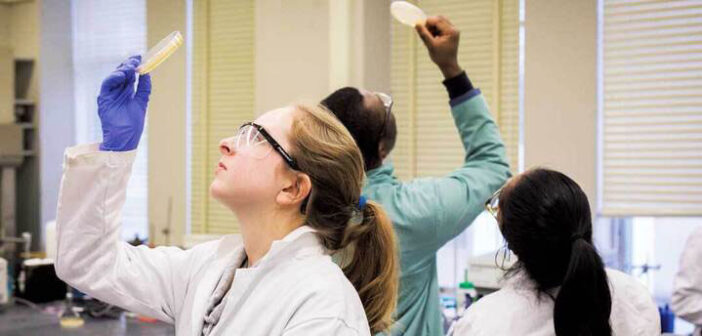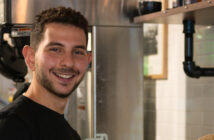Molecular biology professor Vassie Ware said she’s always been interested in the dynamics of genetics. As a researcher, she’s studied genes in different systems and organisms, with early research showing that isolating viruses might be the solution to reduce the effects of medical diseases.
When she found out about Howard Hughes Medical Institute’s Science Education Alliance — Phage Hunters Advancing Genomics and Evolutionary Science, or SEA-PHAGES, program, she wrote a proposal to bring it to Lehigh.
According to its website, SEA-PHAGES “aims to increase undergraduate interest and retention in the biological sciences through immediate immersion in authentic, valuable, yet accessible research.”
In 2009, Lehigh became the second cohort to participate in the SEA-PHAGES program, which is a two-semester undergraduate research course where mostly first-year students can get involved in research on bacteriophages and finding new viruses.
SEA-PHAGES student Nikki Pasterczyk, ‘25, said a bacteriophage is a virus that infects bacteria. She said it’s important to study them because they can help with developing medical treatments.
The program consists of two laboratory courses taught by Ware and biological science professor Margaret Kenna.
Starting in the spring semester, students take BIOS 43, Phage Hunting Laboratory, where they typically work to isolate and purify a novel bacteriophage from an environmental sample by the end of the semester.
The following fall semester, in the second course of the program, BIOS 118, which is a phage genetics laboratory, students learn to use bioinformatics and computational biology tools to define genes within the DNA sequences that were returned from the sequencing center over the summer.
Ware said at the end of the course, phage genomes are annotated and students become co-authors on a GenBank submission, which is a document that contains all the genes that were found. The genome annotation then gets published on the genetic sequence database at the National Center for Biotechnology Information of the National Institutes of Health, and research from each cohort is presented at an annual SEA-PHAGES symposium in the spring.
Overall, Ware said students learn microbiology techniques to purify phages, visualize their phages by transmission electron microscopy, and use molecular biology techniques to isolate phage DNA and learn about the genome of the virus.
“There’s a lot of evidence that having a research experience, and having one early on in an academic career, does a lot of things to help students persist in classes that are hard,” Ware said. “Research excites them about the prospect of contributing something that is new, (and) many people have an interest in doing things that are impactful.”
Unlike “cookbook” laboratory courses where students come in once a week for three hours or so, usually doing a new lab each time where experimental outcomes are often predetermined, Ware said the SEA-PHAGES courses are more intensive and discovery-based.
She said the experimental outcomes are determined based on the biology of newly discovered phages, so students uncover unknowns about their phages through every step of the journey.
“So if you make a mistake, it’s not like it’s not going to matter,” said SEA-PHAGES student Constance Mulligan, ‘26. “If you make a mistake you have to go back and figure out where you made the mistake.”
Mulligan said it may be challenging as a first-year student to enter a research project, but it served as a nice transition from high school. She said she met some of her best friends through this program and it provided a space for her to grow as a researcher.
Ware said the students who participate in this program come to a better understanding of what research and experiments are all about, learning how to build, interpret and critically analyze experiments.
“The fact that they attract specifically (first-years), sophomores and people who haven’t done research is great because you all are kind of in it together,” Pasterczyk said. “Everyone struggles together, learns together.”
Unlike most classes, Ware said this is a class where the professors act as instructional guides and work as collaborators with students in learning about novel phages. She said professors and students are both uncovering information about phage biology.
Through this research, students are challenged to work through their problems and figure out solutions themselves. Ware said it’s gratifying for her to see students build on their confidence throughout the semester as they get more comfortable with their research.
Mulligan said the program has introduced her to other biology-related research opportunities for the future.
Ware said students can continue even after the year is over through programs such as SEA-GENES or take advanced biological phage classes if they want to continue more phage work.
Pasterczyk said the program changed the trajectory of her life, as it inspired her to do research over the summer and sparked new career goals.
“(It’s a) worthwhile thing to have students become collaborators in a way that they build their confidence,” Ware said. “And it’s just plain fun for students and faculty.”






Comment policy
Comments posted to The Brown and White website are reviewed by a moderator before being approved. Incendiary speech or harassing language, including comments targeted at individuals, may be deemed unacceptable and not published. Spam and other soliciting will also be declined.
The Brown and White also reserves the right to not publish entirely anonymous comments.